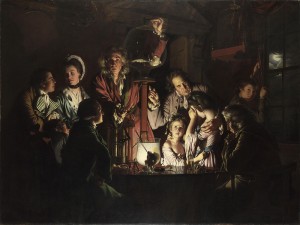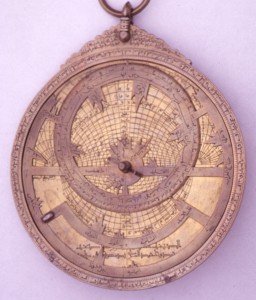Science has an incredible track record for discovering the truth about the material world. But if science answers one kind of question—questions about the nature of the physical world – remarkably well, it does not follow that it will answer every kind of question remarkably well. An it certainly doesn’t follow that these are the only type of question worth asking. We are in danger of missing answers to questions about value, meaning and purpose if we restrict our evidence to the evidence provided by the physical sciences.
 1. Scientific explanations use impersonal objects and laws of nature; we observe and measure how some events regularly follow others. We then use our knowledge of those regularities to explain some state of affairs; we discover how previous events produced other events by mechanical forces according to natural laws. For example, we can explain why Mars in its present location by describing the solar system, where the planets have been recently and Newton’s laws. Or scientific explanations can explain objects by breaking them down into their constituent parts and structures. So we can see how atoms form molecules, and how molecules form cells. Many – but by no means all – scientific explanations make precise mathematical predictions which allow for rigorous testing.
1. Scientific explanations use impersonal objects and laws of nature; we observe and measure how some events regularly follow others. We then use our knowledge of those regularities to explain some state of affairs; we discover how previous events produced other events by mechanical forces according to natural laws. For example, we can explain why Mars in its present location by describing the solar system, where the planets have been recently and Newton’s laws. Or scientific explanations can explain objects by breaking them down into their constituent parts and structures. So we can see how atoms form molecules, and how molecules form cells. Many – but by no means all – scientific explanations make precise mathematical predictions which allow for rigorous testing.
 2. However, there are other types of explanation. Rather than laws of nature and previous states of affairs, agent explanations involves persons and purposes – explaining an event by citing an agent with specific powers and intentions. But can’t agent explanations be reduced to scientific explanations? Only if there is no free will; only if we never really choose and our nervous systems just act and react. If so, we do not control any of our actions; events just happen to us. Agent explanations explicitly deny this view of human nature. Humans are agents who sometimes choose one action over the alternatives. Agents are the initiator of causal chains, and not merely the physical systems in which pre-existing causal chains play themselves out.
2. However, there are other types of explanation. Rather than laws of nature and previous states of affairs, agent explanations involves persons and purposes – explaining an event by citing an agent with specific powers and intentions. But can’t agent explanations be reduced to scientific explanations? Only if there is no free will; only if we never really choose and our nervous systems just act and react. If so, we do not control any of our actions; events just happen to us. Agent explanations explicitly deny this view of human nature. Humans are agents who sometimes choose one action over the alternatives. Agents are the initiator of causal chains, and not merely the physical systems in which pre-existing causal chains play themselves out.
3. If any agent explanation is true, there must be more to the universe than physical particles and forces. We have to believe that there is more to us than the physical parts that make up our bodies; we must have non-physical minds that have some level of control over our actions. Cognitive science and philosophical investigations have demonstrated that the idea of a non-physical agent is coherent and intuitively clear; now perhaps the atheist does not believe that humans are immaterial agents. But that does not mean that immaterial agents could not exist, and that we could not have evidence of their existence.
4. Are scientific theories preferable because they make precise predictions? First, we need to recognise that many good scientific theories do not make precise, mathematical, measurable predictions. Consider the history of life on Earth. Evolution by natural selection does not make precise predictions for many features of life on Earth that it is nevertheless taken to explain. For example, most theorists agree that there is some degree of contingency in the history of life on Earth. If this is right, then evolution does not predict that humans would come into existence given the early history of life on Earth. However, there is clearly a scientific consensus that evolution provides a good explanation of the existence of humans.
5. Furthermore, there are excellent historical explanations which are not open to falsification by a few observations, do not generate predictions, and do not suggest experimental tests. An historian can be confident that Lee Harvey Oswald is responsible for the shots that killed JFK; he can also be confident that Hitler is responsible for the holocaust. Conspiracy theorists and Holocaust deniers can point to all sorts of facts that do not fit neatly with either explanation. For example, some witnesses put a second shooter on the “grassy knoll” in Dealey Plaza; we do not have a written order from Hitler commanding the holocaust. But historians have plausible explanations for these facts.
6. Are scientific explanations superior because they cite mechanisms? Even in a science such as physics, mechanisms are not nearly as important as is often assumed. Isaac Newton’s theory of gravity, for example, provided powerful explanations of planetary motion even though there was much disagreement about the mechanism by which one massive body exerted a force on another. The same applies in quantum theory; no-one really knows what’s going on, but quantum theory certainly explains a lot!
In neuro-physiology, Benjamin Libet hypothesised that conscious intentions could have an effect on the brain and eventually concluded that they could “veto” activity in the brain. His conclusions are disputed, but they are firmly within the realm of science. Outside science, historians will often explain events in terms of choices, beliefs and motivations and will not care one jot if these can be reduced to brain events. There simply is no need to cite mechanisms for these explanations to have purchase.
 7. We do not interpret narratives, novels, poems, paintings, polemics or extended arguments using mathematical models or rigorous experimentation. To interpret a writer, or to enter the world of a text, we need imagination and intuition, empathy and experience. We do not explain the meaning of a text using anything like scientific explanations. Which makes it rather odd that so many writers expend so much time producing texts to argue that scientific explanations are the only explanation worth having.
7. We do not interpret narratives, novels, poems, paintings, polemics or extended arguments using mathematical models or rigorous experimentation. To interpret a writer, or to enter the world of a text, we need imagination and intuition, empathy and experience. We do not explain the meaning of a text using anything like scientific explanations. Which makes it rather odd that so many writers expend so much time producing texts to argue that scientific explanations are the only explanation worth having.
